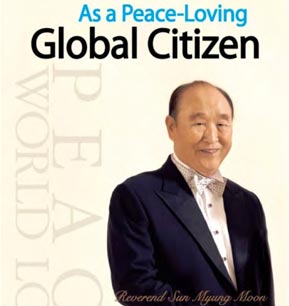ShareThis
Rev. Sun Myung Moon

As a Peace-loving Global Citizen is the autobiography of Rev. Sun Myung Moon, the founder of the Unification Movement. It was published in 2009 in both Korean and English by Gimm-Young Publishers of Seoul, South Korea. The book was released in South Korea on March 9, 2009 and debuted at #3 on the Businesss bestseller's list. It has ranked in various bestseller lists since then and was ranked 15th on the General bestseller's list as of October 14, 2009.
“Allow Freedom of Religion in the Soviet Union”
In the end, Dr. Kaplan declared “the end of Soviet communism” at a conference of the Professors World Peace Academy (PWPA) held in Geneva under the title, “The Fall of the Soviet Empire: Prospects for Transition to a Post-Soviet World.” It was something that no one had dared consider. Because Switzerland was a neutral country, Geneva was a major staging area for the Soviet Committee for State Security (KGB), and many KGB agents worked from there to carry out espionage and terror activities around the world. The Intercontinental Hotel, where the PWPA conference was held, faced the Soviet embassy across the street, so I can well imagine how much fear Dr. Kaplan must have felt. A few years later, however, he became well-known as the scholar who first predicted the end of Soviet communism.
In April 1990, I convened the World Media Conference held in Moscow. Unexpectedly, the Soviet government gave me head-of-state–level protocol, beginning at the airport. We were transported to the center of Moscow in a police-escorted motorcade. The car that carried me traveled on the yellow section of the road, which was used only by the president and state guests. This happened before the collapse of the Soviet Union. The Soviet government afforded this exceptional treatment to me, an anti-communist.
At the conference, I gave an address praising the move toward perestroika. I said this revolution must be bloodless, and that it must be a revolution of the mind and spirit. The purpose of my visit was to attend the World Media Conference, but my mind was focused on meeting President Gorbachev.
At the time, President Gorbachev was popular within the Soviet Union, following the successes of his perestroika policies. I could have met the U.S. president ten times if I’d wanted to, but meeting President Gorbachev was much more difficult. I was concerned that even one meeting might be difficult to achieve. I had a message to give him, and it was important that I do this in person. He was reforming the Soviet Union, giving rise to the winds of freedom there, but as time passed, the swords of reform were being increasingly pointed at his back. If the situation were left unchecked, he was about to fall into great danger.
I explained, “If he does not meet me, he has no way to catch the wave of heavenly fortune, and if he cannot do that, he will not last long.”
Monday, December 13, 2010
|
Labels:
“Allow Freedom of Religion in the Soviet Union” part3
|
CONTENT
- FOREWORD
- CHAPTER ONE - Food is Love
- CHAPTER TWO - A River of Heart Flows with Tears
- CHAPTER THREE - The Man with the Fullest Stomach
- CHAPTER FOUR - Why We Work Globally
- CHAPTER FIVE - True Families Create True People
- CHAPTER SIX - Love Will Bring Unification
- CHAPTER SEVEN - Future of Korea, Future of the Wor...
- CHAPTER EIGHT - Message for Young People

